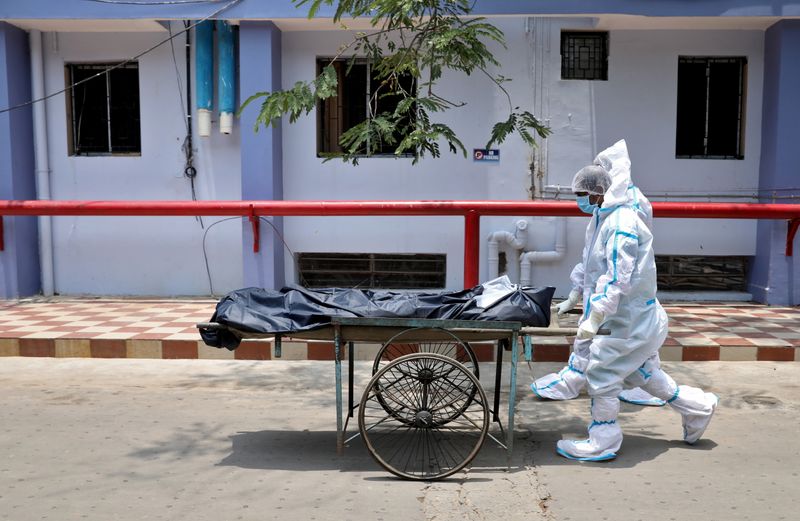By Tanvi Mehta and Sanjeev Miglani
NEW DELHI (Reuters) -India recorded more than 4,000 COVID-19 deaths for a second straight day on Thursday, while infections stayed below 400,000 for a fourth day, although the virus has become rampant in rural areas where cases can go unreported due to a lack of testing.
Experts remain unsure when numbers will peak and concern is growing about the transmissibility of the variant that is driving infections in India and spreading worldwide.
Bhramar Mukherjee, a professor of epidemiology at the University of Michigan, said most models had predicted a peak this week and that the country could be seeing signs of that trend.
Still, the number of new cases each day is large enough to overwhelm hospitals, she said on Twitter. "The key word is cautious optimism."
The situation is particularly bad in rural areas of Uttar Pradesh, India's most populous state with a population of over 230 million. Television pictures have shown families weeping over the dead in rural hospitals or camping in wards to tend the sick.
Bodies have washed up in the Ganges, the river that flows through the state, as crematoriums are overwhelmed and wood for funeral pyres is in short supply.
"Official statistics give you no idea of the devastating pandemic that is raging through rural UP," wrote well-known activist and opposition politician Yogendra Yadav in The Print.
"Widespread ignorance, lack of nearby or adequate testing facilities, official and unofficial cap on testing and inordinate delays in test reports have meant that in village after village, virtually no one has been tested, while scores of people complain of a ‘strange fever’".
According to health ministry data, India had 362,727 new COVID-19 infections over the last 24 hours while deaths climbed by 4,120.
At least two Indian states have said they plan to dose their populations with the anti-parasitic drug ivermectin to protect against severe COVID infections as their hospitals are overrun with patients in critical condition.
The moves by the coastal state of Goa and northern state of Uttarakhand come despite the World Health Organization and others warning against such measures.
CRISIS EASES IN DELHI
The surge in infections appears to be tapering off in the capital New Delhi, which has been one of the hardest-hit areas in the country.
Manish Sisodia, the deputy chief minister of Delhi state, told reporters the ratio of infections to the number of people tested had fallen to 14% from 35%. The demand for medical oxygen, which was in short supply for weeks, had also fallen off, he said.
India's deadly second wave of infections, which erupted in February, has been accompanied by a slowdown in vaccinations, although Prime Minister Narendra Modi announced that vaccinations would be open to all adults from May 1.
ALthough it is the world's largest vaccine producer, India has run low on stocks in the face of the huge demand. As of Thursday, it had fully vaccinated just over 38.2 million people, or about 2.8% of a population of about 1.35 billion, government data shows.
The national drugs regulator has also permitted Bharat Biotech to conduct phase II and III clinical trials of the domestically developed COVID-19 vaccine Covaxin in children aged 2 to 18 years.
Two states - Karnataka, which includes tech hub Bengaluru, and Maharashtra, which includes Mumbai - have announced they will temporarily suspend vaccination for people aged 18-44 years as they prioritize those over 45 who need their second dose.
Maharashtra also announced that curbs on movement would be extended until the end of the month in a bid to break the chain of infections. Mostly rural Bihar in the east extended curbs until May 25.

Modi has left it to state governments to impose such curbs.
The head of the Indian Council of Medical Research, the main health agency responding to the pandemic, has told Reuters that areas with high infections had to be locked down for 6-8 weeks.